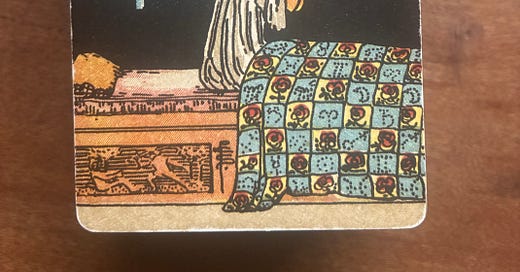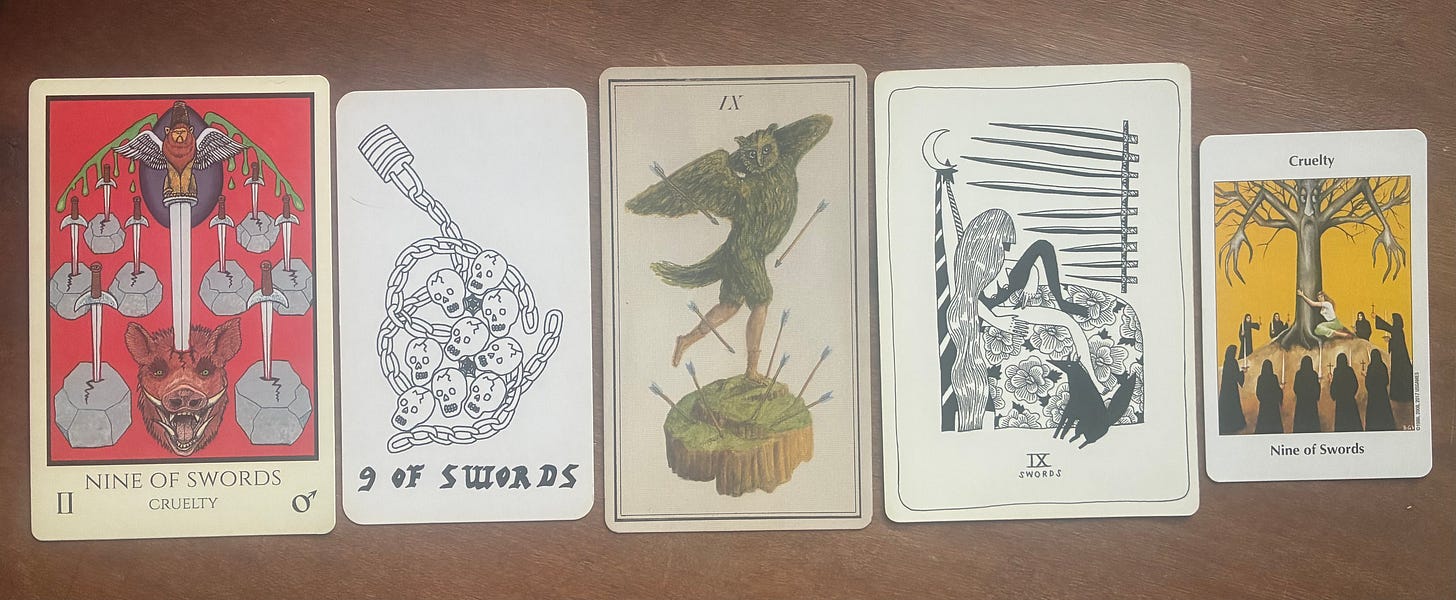As mentioned in the previous post for Gemini I, the 9 of Swords could certainly be one of the top 10 most recognizable cards in the tarot (if such a list existed).
I think this is because the image is one that we can directly relate to from our own lived experience.
Up at night. Worrying. Head in our hands. Imagining the worst as we watch – or, perhaps, live – the worst already happening. Worrying about what we can do. If anything.
Unsurprisingly, this second decan of Gemini is ruled by Mars, the planet most likely to weaponize our thoughts.
What an apt topic for Gemini season, the sign that conjures duality, that contemplates both sides of the coin, both sides of the blade. With Mars as the face of this decan, we are presented with the darker side: our troubled thoughts. Nightmares of the mind that seem to follow us into reality.
If we look at all of the images of this card from the decks we’ve been referencing since the first decan, Aries I, the word “Cruelty” for this decan doesn’t come as a surprise.
When I sat down to begin writing my reflection on this decan, I kept seeing the word flash in my mind in a font and color that looked familiar. I was confident that there was a poetry book trying to make its way to the front of my mind, that was silently screaming to be referenced.
When I did a DuckDuckGo search for the words “Cruelty poetry book,” and Ai’s book appeared, that sense of calm rushed in that comes when we’ve found an answer we’ve been looking for – or when we’ve resolved the problem in our mind that has been keeping us up into early hours of the morning.
It's been 10 years or more since I’ve spent time with Ai’s poems. For a time her work captivated me with its ability to viscerally and unflinchingly communicate some of the more difficult lived experiences of the human condition. Even if the voices and people within them were fictional, the familiarity and feeling they relayed were eerily palpable and unforgettable.
According to Wikipedia: “Concerning the poems in her first collection, Cruelty, [Ai] said: ‘I wanted people to see how they treated each other and themselves.’”
Though she recognized the cruelty in her poems, the cruelty wasn’t for cruelty’s sake. Instead, she hoped that her poems would be a pathway toward understanding, toward empathy.
No wonder, then, that she chose the word “Ai” as her pen name. A word that means “love” in Japanese.
In this way, I suppose her poems were a kind of tough love. Knowing perhaps that shocking poems full of violence and harrowing circumstances were more likely to catch readers’ attention? That perhaps the difficult stories are the ones more likely to remind us of our shared humanity?
Perhaps too it is the cruel that wakes us up to the reality of the world, of what needs changing.
In Carolyn Forché’s foreword to the 1987 reprinting of Ai’s first two collections Cruelty and Killing Floor, she writes:
“From Russia, Mexico, Buchenwald and Minnesota, the voices speak of patricide, necrophilia, self-immolation, cannibalism and torture, converging in the single voice of an old soul, androgynous and driving, a ghost ranging space and time, drawn to moments in which the oppressed one is moved to act. Ai is concerned with that single moment, revelatory and disassociated, which is the hinge of human history, facilitating radical change, allowing the heart to open to a new order.”
As I write this and the Sun moves through the last minutes of this decan in Gemini ruled by Mars, the Flotilla named Madleen that was headed toward Gaza to deliver even the smallest bit of aid was abducted by Israel.
Many are suggesting that the people on the Madleen knew it was likely that they would be captured. And, yet, out of their concern—out of their empathy—for what is happening to Palestinians, these brave people set out on their voyage anyway.
Because they understand that what is going on in Gaza—the starvation, the genocide, the apartheid—has to stop. And they hoped, even if they were intercepted, that their act of bravery might prompt more acts of bravery, prompt a shift in international response (or lack thereof).
Of course the shock and awe of what is happening is meant to cause us anxiety, meant to make us afraid, meant to keep us up at night with feelings of overwhelm and sadness and worry.
But it's like when we are experiencing the 9 of Swords on a personal level and we feel stuck and/or afraid, laden with the weight of our worry, often all we need to do is to move. Even if it’s just to get out of bed and turn on the light. Or put our hands down, look around, maybe out at the stars. Taking one small step is usually enough to snap us out of building anxiety.
For those who embarked on the Madleen they could no longer do nothing. Just as the protesters in L.A. could not stand by and watch their loved ones and neighbors be taken away by ICE. In their own ways they had to resist, to stand up for what is right, to do something.
Though it isn’t uplifting, I’ll end here with a poem from Cruelty.
STARVATION Rain, tobacco juice, spit from the sky shatters against your body, as you push the pane of glass through the mud. The white oak frame of the house shakes when I slam the door and stand on the porch, fanning myself with a piece of cardboard, cut in the shape of a ham. There’s a pot of air on the stove. You drove seventy miles, paid for that glass and I can’t remember the last good meal I had, but bring it up here. I’ll help you. I’m not angry. We’ll paint the sun on it from the inside, so if we die some night, a light will still be on. It’s hell to starve in the dark. I don’t know why. I’m just your woman, like you, crazy to lose all I’ve got. It’s rotten, you know, rotten. The table’s set. What time is it? Wash your hands first. You’re late.






